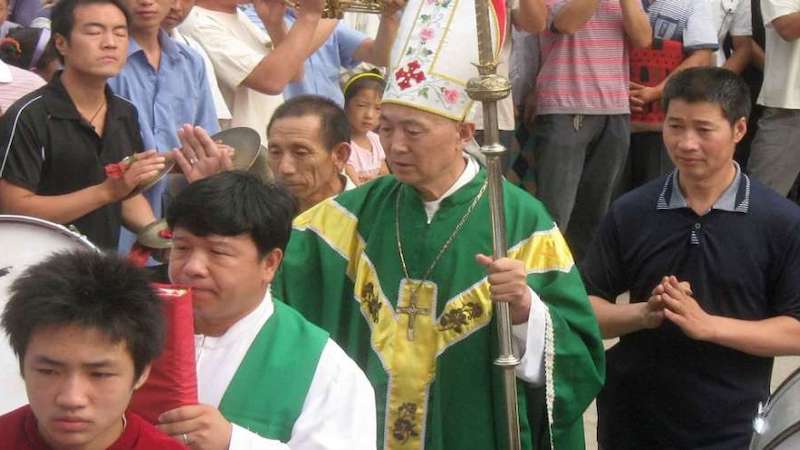By Benedict Rogers
(UCA News) — The death last week of one of the most prominent leaders of China’s underground Catholic Church, Bishop Julius Jia Zhiguo, was met with curious silence from the Vatican.
Bishop Jia, of Zhengding diocese, in China’s northern Hebei province, died on Oct. 29 at the age of 91, after years of enduring torture in prison for his resistance to pressure by the Chinese Communist Party (CCP) to join the state-controlled Catholic Patriotic Association (CPA). His death was reported by Catholic outlets in Asia, such as UCANews and Asia News, but ignored by the Vatican and other Catholic media close to the Vatican.
Bishop Jia was first imprisoned by the regime in Beijing in 1963, and spent 15 years in jail for his refusal to renounce his allegiance to the pope. He was able to be ordained as a priest in 1980, and was clandestinely consecrated as a bishop a year later. His region of Hebei is home to an estimated 1.5 million Catholics, one of the largest concentrations of the Church in China.
After his release from jail in 1978, the bishop subsequently faced repeated further arrests and detentions and was under constant surveillance. Altogether, he was detained more than ten times, including in 2004 when he went missing after his arrest in Hebei province. He was detained again in 2008, 2009, and most recently in 2020, just before the Feast of the Assumption. It is believed he endured torture — on one occasion, the authorities reportedly flooded his prison cell with water, causing bone spurs that left him in pain for the rest of his life.
In addition to his priestly ministry, Bishop Jia founded an orphanage in Hebei for abandoned children, which authorities demolished in 2020 because it lacked government approval. His diocese of Zhengding remained outside the state-controlled institutions, even after the 2018 Sino-Vatican agreement on the appointment of bishops.
In a statement sent to AsiaNews, the Catholic community in Hebei said: “Bishop Jia’s life was marked by suffering and repeated arrests and imprisonment, but his heart as a pastor never changed.”
They paid tribute to Bishop Jia, saying: “We are grateful to you for your extraordinary courage in founding and leading multiple dioceses, transmitting the flame of the Church; we are grateful because, even when you were repeatedly arrested and imprisoned, you continued to care for the flock, preserving the flame of hope in the darkest nights.”
Their statement continued: “The Lord said: ‘The harvest is plentiful, but the laborers are few’. You responded to this call your entire life, to the point of being completely worn out. Now you have arrived in the heavenly homeland, where there is no more pain nor oppression. We pray to you: before the Father, intercede for us and for the Church in China.”
One might have thought that a bishop who had suffered so much for his loyalty to Rome, was clearly loved and respected by his flock, and had devoted so much of his life to serving the Church and society, would deserve a tribute from the Vatican upon his death. But the Vatican has so far been silent. Why? Could it be a deliberate move, designed to ignore the underground Church in China in the hope that it dies out, combined with a nervousness about offending the CCP regime?
Only Vatican insiders know the answers to these questions. But if it is not a deliberate conspiracy of silence, Pope Leo XIV should lead public tributes to Bishop Jia. He has already taken some small, tentative, positive steps to chart a slightly different direction on China policy from that of his predecessor — including meeting recently the wife and daughter of Hong Kong’s prominent Catholic political prisoner Jimmy Lai at a General Audience, and hinting in an interview at an openness to rethinking Sino-Vatican relations after dialogue with persecuted Chinese Catholics.
With these welcome steps in mind, in recognition of a great Chinese bishop and in solidarity with his flock in China, the pope should publicly mourn Bishop Jia at the earliest opportunity.
The views expressed in this article are those of the author and do not necessarily reflect the official editorial position of UCA News.
